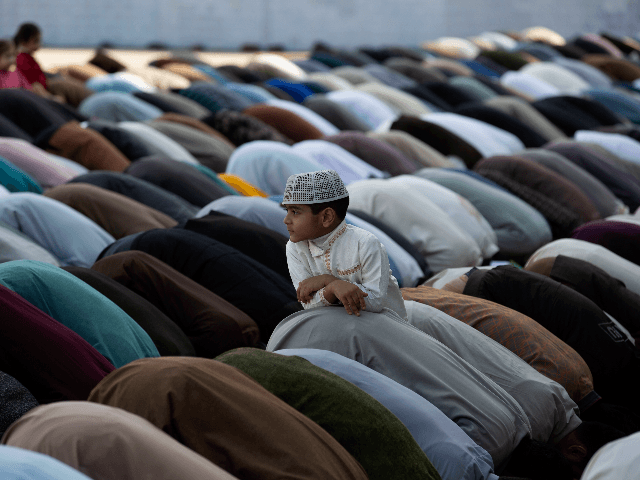A report produced on Tuesday by the city government of Rawalpindi, in the Pakistani province of Punjab, found that most of the city’s 250 most sensitive mosques were ignoring guidelines provided for safe worship during the coronavirus pandemic.
The violations were especially widespread during Taraweeh, an additional prayer service observed during the Ramadan holiday.
Pakistan’s Dawn explained that mosques and imambargahs (halls where Shiite Muslim clerics can address women and children who are normally forbidden in mosques) were examined for their coronavirus vulnerability and rated on a scale of A, B, or C to determine how strict their pandemic precautions should be.
The regional police performed an audit and found that while masks and hand sanitizer were generally used as directed, many of the mosques allowed elderly people and children into risky, crowded areas where they were not supposed to go, and some did not provide clean floors for prayers.
Some of the riskiest mosques were not designed in a manner that facilitated good virus control measures, offering crowded and poorly-illuminated public spaces or inadequate space for worshipers to wait until they were admitted to the prayer halls.
Another security directive required metal detectors for all visitors, but 43 of the 250 mosques covered in the study did not provide them.
Pakistan has a running problem with hardline Muslim imams defying anti-pandemic measures and encouraging their followers to follow suit.
The New York Times noted in late April that “most clerics complied with the shutdown when it was announced, but some of the most influential ones immediately called on worshipers to attend Friday prayers in even greater numbers,” and those worshipers “attacked police officers who tried to get in their way.”
Clerical resistance to coronavirus precautions grew as Ramadan approached until a group of influential Muslim leaders wrote a letter demanding an exemption for mosques from the national pandemic lockdown, with the wrath of Allah and his faithful threatened against officials who refused to comply.
The Pakistani government submitted to this demand, allowing mosques to remain open for Ramadan provided they follow a list of 20 social distancing rules, which the Rawalpindi auditors said many of their mosques proceeded to ignore. A 21st rule that would have limited the size of congregations during Ramadan was rejected out of hand by the clerics, leading less fervent Pakistanis to wonder if Prime Minister Imran Khan had lost control of his government to the imams.
Writing at the Washington Post last week, Brookings Institution fellow Madiha Afzal anticipated precisely the indifferent level of compliance discovered in Rawalpindi. Afzal noted in advance what the police discovered during their audit: many of the 20 pandemic requirements were “impractical to follow” in the crowded mosques, and enforcement was nearly impossible with countless mosques holding five prayer sessions a day plus the extra Taraweeh prayers during Ramadan.
Afzal saw the Ramadan pandemic showdown as a power struggle between Prime Minister Khan, who “burnished his conservative image during his time in politics” and therefore “has more credibility with Islamists than most,” and fundamentalists who want Muslim law enforced by the secular government, while the ambitious and opportunistic Pakistani military looks for any sign that Khan’s position might be weakened by a clash with the religious establishment.
A prominent Pakistani religious leader named Abdul Aziz – a hardliner hard enough to have sent armed followers to make an unsuccessful stand against Pakistani troops when they raided his mosque in 2007 – told Al Jazeera that he and like-minded imams considered prayer more important than ever during the pandemic, particularly during Ramadan.
Aziz sneered at social distancing, finding the advice of doctors inferior to “the word of God” and saying that since he believes the coronavirus is a form of divine punishment, meted out “because we have filled the world with sins,” it would be sinful to compromise religious services in order to resist infection.
“We believe the people should not be made to fear things right now, they should have faith in God at this time, and to place their hope in him,” Aziz said. “If death is written for you, then it will come.”

COMMENTS
Please let us know if you're having issues with commenting.